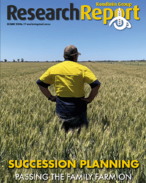This article is 7 years old. Images might not display.
NFF CEO Tony Mahar said a modern, efficient inland freight rail system was crucial to the ongoing international competitiveness of Australia’s food and fibre industries.
“Currently, logistics are the largest, single cost item in the production of many agricultural industries, amounting to as much as 48.5 per cent of farm-gate costs,” Mahar said.
“To date, Australia has relied upon on-farm productivity growth to underpin the long term viability of farm businesses but this is not sustainable,” he said.
“The Government’s proposed inland rail project would offer significant benefits to the future prosperity of the farm sector. According to modelling, inland rail would deliver a transit time for freight of less than 24 hours between Melbourne and Brisbane (1700kms) with a 98% service reliability that is competitive with road.
“It is essential the development includes port to port access, effective intermodal access and a competitive freight price when compared with road.”
Mahar said greater investment in future-focussed freight infrastructure was a non-negotiable priority for agriculture.
“Farmers require a least-cost pathway to market and inland rail as a large role to play in delivering this,” Mahar said.
“For Australian farmers there are few bigger issues than driving down the cost of production – of which getting produce to market is a significant part of,” he said.
“In this Budget we ask Deputy Prime Minister and Minister for Agriculture, Barnaby Joyce and his Government to put a nation-building project well and truly on track by committing a genuine slice of cash to inland rail.”
“In this Budget we look forward to seeing economic leadership and fiscal measures that allow Australian agriculture to thrive – because at the end of the day - every cent counts.”
Australian agricultural production is tipped to reach a record $63.8 billion in 2017-2018 and with this comes a vastly increased land freight task.
According to Infrastructure Australia, the land freight task between Brisbane and Melbourne is set to increase from about 4.9 million tonnes in 2016 to 13 million tonnes, or about 1.1 million twenty-foot equivalent units (TEU), by 2050.






















